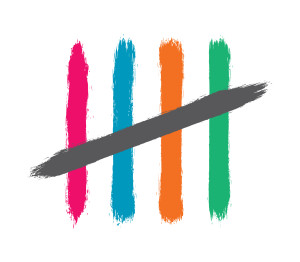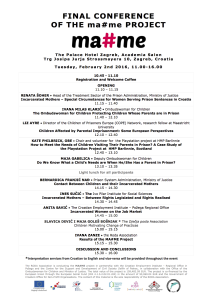The MA#ME project will host its final conference at the Palace Hotel, Zagreb, on Tuesday 2 February, from 11.00-16.00. The conference will be attended by panelists from Croatia and elsewhere in Europe, and Croatian-English and English-Croatian translations will be provided throughout the event. Speakers will include the Director of COPE, Liz Ayre, COPE board member and former President Kate Philbrick, OBE, and COPE member the Croatian Deputy Ombudswoman for Children, Maja Gabelica Šupljika. There will be discussion on the problems and best practices in Croatia and the ways of improving and maintaining a positive relationship between children and their incarcerated parents, among other topics. For more information on the conference as well as the project, please visit RODA’s website (in Croatian).
MA#ME – Motivation and advocacy for incarcerated mothers’ empowerment in the fields of work, family relations and society
The overall objectives of the MA#ME project were to promote the employability, social inclusion and quality of life of female prisoners and their families, especially children, and to promote partnerships in implementing advocacy and motivation programmes for women prisoners and their families.
The specific objectives of the project were to build the capacities and possibilities for networking and partnerships between civil society organisations and academic and state institutions for the development and implementation of public policies and practices targeting prisoners and their families, especially children. Increasing the women prisoners’ social inclusion, quality of life, employability, parenting skills, and strengthening their family bonds are further objectives of the project as well as raising awareness among experts, political decision-makers and the wider public about the issues surrounding children with imprisoned parents.
The project has been conducted in partnership with RODA – Parents in Action (Zagreb), Delphin – the Centre for the Assistance and Development of Civil Society (Pakrac) and the Croatian Employment Institute in Požega. The Ministry of Justice Prison System Directorate gave approval for the project that will be carried out at Požega women’s prison. Recognising its importance, the Ministry of Justice Prison System Directorate and the Ombudsperson for Children agreed to support the project by joining it as associates.
The ultimate beneficiaries of the project are the children and families of incarcerated parents in Croatia. Their rights, options and opportunities have been enhanced through the networking and synergy of the various stakeholders, which has resulted in an increased awareness of the public and policymakers about the needs and rights of incarcerated parents. Furthermore, this has increased social inclusion, with an emphasis on strengthening the prisoners’ parenting skills, as well as increasing the rate of employability for parents recently released from prison. The project has also targeted decision-makers and other key actors in this field, such as decision-makers and staff in relevant government Ministries, the law enforcement sectors (police and judiciaries), NGOs, civil society organisations, child rights experts and other human rights advocates, the general public and the media.
There are 189 women incarcerated at Požega, all of whom are serving sentences longer than six months, and one-third of whom have children under the age of 18. This group is marginalized in many ways and the women have often experienced social exclusion even before incarceration. They have low levels of education (51/189 of them have only elementary-school education, some were completed, some not); they are poor, unemployed and many of them are members of national minority groups (e.g., women from the Roma population). Due to the frequent stigmas attached to women who have committed crime, they are often burdened with fragmented families and relationships, and face difficult emotional challenges. This project aimed to increase the employability of incarcerated women upon release from prison by ensuring that they receive timely support and assistance in job market opportunities and special schemes for former prisoners throughout the six months before scheduled release. It has included information sessions and workshops, increasing their work and parenting skills and commitments to empowering them in the area of work, family and society. By lobbying stakeholders and motivating civil society organisations to use research data, building inter-sectoral collaboration and networks, the partners contribute to boosting the visibility of the various problems faced by these groups, including the needs of children whose parents are incarcerated, and encouraging changes in laws and policies in favour of this marginalised group.
At the end of 2012, there were 65 mothers of 134 underage children housed at Požega. Two children under the age of three were housed together with their mothers in the prison while the remaining children were located with their families, or, due to the large number of fragmented families, were located in guardian and foster families, orphanages and “SOS centres”. Due to the location of the prison and the socioeconomic status of these families, prisoners’ children are often not able to visit their mothers regularly and often lose all close contact with them. The ultimate beneficiaries of the MA#ME project are the children of all incarcerated parents in Croatia and their families: a total of around 18,000 children each year. The issues surrounding these children are the same as those of the target group. They will all benefit from the inclusion of a greater number of stakeholders in shaping resolutions and advocating for improvement in practices and policy solutions.
The project was designed in part to contribute to the sustainability of RODA and Delfin as advocacy-oriented civil society organisations in their roles as promoters of employability, social inclusion and improvement of the quality of life of young mothers, their children and families. From the beginning, it aimed to strengthen RODA and Delfin’s capacities in advocating for policies, motivating relevant institutions and the public as well as incarcerated women and their families to engage in advocacy activities that would improve the young mothers’ employability, social inclusion and quality of life following imprisonment, as well as those of their children and close family members.




